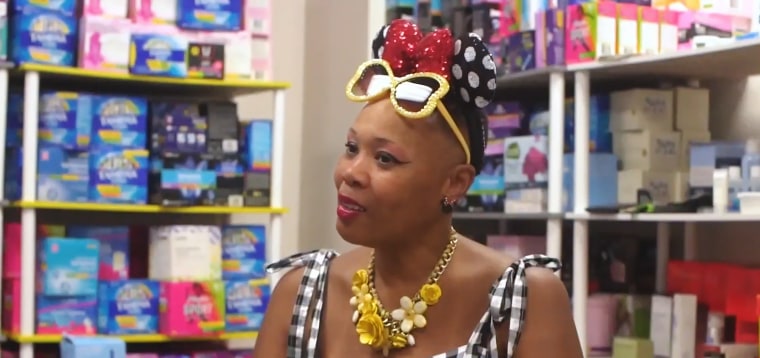PHILADELPHIA — Lynette Medley and her daughter, Nya, start their day placing Mickey Mouse ears atop their heads and coordinating their colorful outfits. They want to appear approachable and welcoming because their next step involves products that even in modern America make people hesitant, hushed or squeamish.
The mother-daughter duo stack dozens of boxes filled with period products into their large truck adorned with imagery of a uterus and menstrual pads, drawn in cartoon style with eyes and smiles.
The Medleys are headed to one of their regular pop-ups hosted by their nonprofit, No More Secrets, to distribute period products to women and girls in need. Between an ongoing tampon shortage and rising inflation, menstrual hygiene management is becoming harder and more expensive for women around the world.
In the U.S., roughly 16.9 million women who menstruate are living in poverty, according to the Journal of Global Health Reports, and about two-thirds of them were unable to afford menstrual products in the past year. Many were forced to choose between vital hygiene products and food, it said.

The journal defines “period poverty” as a lack of access to menstrual products, hygiene facilities, waste management and education that affects many women globally, causing physical, mental and emotional challenges. Around the world, at least 500 million people struggle with menstrual hygiene management.
Period poverty became important to Medley following a divorce, when she didn’t have the money to pay for the products she and her daughter, who is now 30 years old, needed.
“We were suffering in silence,” Medley said. “We used paper towels or whatever we could. I didn’t feel I had the voice to articulate that this was a need.”
With No More Secrets, she turned her pain into a passion project. In the last year, the organization opened “The Spot,” a community center in Philadelphia’s Germantown neighborhood where people can make an appointment to pick up products. She calls the center the nation’s first “menstrual hub and uterine wellness center,” and it gives out about 60,000 products a week collected through donations. Over the last year, it has distributed more than 6 million period products, she said.
Medley gives demonstrations to visitors to make sure they know how to use the tampons, pads, menstrual cups and period underwear. She also wants to make sure the people who use cups have access to running water because the product needs to be cleaned regularly. The ability to give out products that are reusable could “save people thousands of dollars in the long run,” she said.
Federal nutrition programs for those living under the poverty line do not cover menstrual products, leaving it up to private organizations to fill in the gaps, even though more women live in poverty than men.
Amber, a certified nursing assistant and mother of two, who didn’t want her last name used for privacy reasons, visited the pop-up recently and remembered how desperate she was for help when she was younger.
“I wish I had this,” she said. “It would’ve helped out a whole lot.”
Period poverty can include social, cultural and political barriers, said Dr. Shelby Davies, a fellow at the Children’s Hospital of Philadelphia, who studies period poverty and health equity.
“We don’t think about some of the mental health outcomes that can come from this,” she said. “Period poverty can lead to worsened anxiety and depression for young people and it can also truly interfere with normal teen social and emotional development.
“A young person may not be afforded that opportunity to really develop their own identity, because they’re so concerned and wrapped up with taking care of their periods and feeling that shame and stigma.”
Some advances are being made. Colorado, Louisiana and Iowa are getting rid of the “tampon tax” on menstrual products, and Scotland recently became the first country to offer free pads and tampons to anyone in need.
“I don’t want to be doing this work; I have to do it,” Medley said. “But if we need organizations like mine to be able to address this deficit, for something that’s normal and natural as a period, what does that say about us as a community? What does that say about us as a federal governing body that’s supposed to protect our most vulnerable populations?”